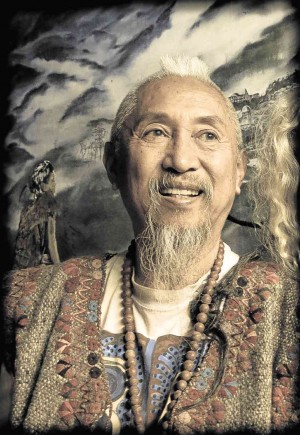
IN 1977, Kidlat Tahimik premiered his first film, “Perfumed Nightmare,” in Berlin—for which he won the Fipresci critics’ prize. PHOTO BY KIDLAT DE GUIA
Like his film’s hero Enrique of Malacca, first man to circumnavigate the world, Filipino filmmaker Kidlat Tahimik has come full circle.
Kidlat won the Caligari Prize in the Forum section of the recently concluded Berlin International Film Festival in Germany for his film “Balikbayan #1 (Memories of Overdevelopment Redux III).”
35 years
Kidlat took 35 years to complete “Balikbayan,” which centers on Enrique, Portuguese explorer Ferdinand Magellan’s slave. Kidlat plays Enrique, reputed to be the first man to travel from Asia to Europe and back.
Berlin was a homecoming of sorts for Kidlat. His first film, “Perfumed Nightmare,” won the Fipresci (International Critics’) Prize at the Berlinale in 1977.
“Balikbayan” almost didn’t beat the Berlinale deadline. “Before Christmas (2014), Voyage Studios helped Kidlat finish a draft that he was confident enough to send to international film festivals,” film editor Chuck Gutierrez told the Inquirer. “It was past the Berlin deadline; still we sent a rough draft via the Internet and the programmers loved it!”
Gutierrez recalled that Kidlat felt sentimental about this latest journey to Germany. “He told me that he really hoped to premiere at the Berlinale. He feels ‘Balikbayan’ is his last film [and that] it is fitting to end his voyage where he started.”
In a 2012 interview, after he won the prestigious Fukuoka Prize for Arts and Culture (from Japan), Kidlat told the Inquirer that he planned to retire soon.
He said he had earmarked the Fukuoka cash prize (3 million yen or P1.6 million) for a project in Hapao, Ifugao. “I want to document (on video) oral traditions, the disappearing culture, of the elders, so we can pass them on to younger generations.”
He planned to retire in Hapao, he said. “I have a hut, an abong, there.”
Sponsored by the German Federal Association of Communal Film Work and Filmdienst magazine, the Caligari award comes with a cash prize of 4,000 euros (P201,714)—“half is given to the director; the other half is meant for fund distribution.”
The Caligari jury was composed of critics and curators: Michael Baute, Maximilian Becker, Barbara Fischer-Rittmeyer, Nils Daniel Peiler and Margarete Wach.
‘Transformative’
In its citation, the jury hailed “Balikbayan” as a “transformative, self-reflexive dialogue with heterogenous material … [it] demonstrates that history and its colonial imaginations [need to be] constantly written, over-written and rededicated.”
The jury described the film as “complex, colorful, flashy … a trip … a hybrid of documentary, fiction, essay … it counters its meager production conditions with rich, playful intelligence … an energetic comet.”
Raves came from other critics as well.
Said Filmcritica.net: “The only real discovery [in Berlin] is the mysterious ‘Balikbayan.’”
Mubi.com’s Adam Cook agreed: “An exhilarating free-form docu-fiction piece … the way Kidlat has assembled everything … is special … an impressive formal feat … inexplicable and whimsical beauty.”
“The film has received invitations from other fests after Berlin,” Gutierrez said.
(bayanisandiegojr@gmail.com)